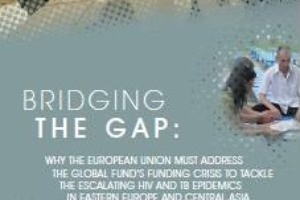Health experts: Funding cuts will halt and reverse progress on TB and HIV unless EU acts now!
Eastern Europe and Central Asian countries will not have the funds required to aggressively tackle their TB and HIV epidemics.
A significant reduction in global funding to Eastern European and Central Asian countries looks set to undermine achievements made in the fight against TB and HIV and lead to rising rates of disease and drug resistance, according to a report released by leading health non-governmental organisations today. The report calls on the EU to step in to fill the gaps left by global donors to countries within and neighbouring its borders.
Tuberculosis (TB) in the European region kills seven people every hour and 1.4 million people are currently living with HIV. The Global Fund to Fight AIDS, TB and Malaria is the largest and most important international donor for TB and HIV in the European region. Due to funding shortfalls and changes in eligibility criteria that are restricting funds being made available to middle income countries, Eastern Europe and Central Asian (EECA) countries will not have the funds required to aggressively tackle their TB and HIV epidemics.
Aaron Oxley, Executive Director of RESULTS UK, explained: “Country income does not determine the number of people who have access to health services. The Global Fund provides targeted prevention and treatment services for underserved populations that are most vulnerable to TB and HIV epidemics. The reality is that many national governments are unable or unwilling to fill gaps left by a reduction in Global Fund support. This is an issue where the European Union has a unique opportunity to demonstrate leadership and to ensure these vulnerable populations are not abandoned.”
EECA have concentrated HIV epidemics and very high rates of TB, including drug-resistant TB. The European region is home to the highest documented rates of drug resistant TB in the world and accounts for nearly 20 percent of the global burden, and EECA is the only one of two regions globally where the number of new HIV cases continues to rise every year.
Underfunding HIV and TB programmes in the European region will inevitably contribute to increasing rates of disease and drug-resistance. This will cost lives and cause an enormous drain on the European region’s economy due to increased treatment costs and lost productivity. For example, WHO Europe estimates that if immediate steps are not taken to address drug resistant TB in the European region, the economic loss to the region will be US$ 12 billion within five years.
Jonathan Stillo, a medical anthropologist who has researched tuberculosis in Romania since 2006, said: “In Romania, the Global Fund grant ensured an uninterrupted supply of medication used to treat drug resistant TB, including two drugs that are not available anywhere else in the country. A reliable and ongoing supply of these drugs is critical to prevent a further increase in drug resistance, and this funding crisis is happening at a time when there is no viable substitute for the Global Fund in the region.”
The Global Fund not only supports treatment and prevention programmes, it also funds civil society organisations that carry out advocacy work critical for creating an environment in which national governments will transition to funding these life-saving programmes themselves. While some argue that wealthier countries should pay for their own health programmes, in practice much work is left to be done in terms of creating the political will within countries to meet the need.
The non-governmental organisations are calling for the EU to make targeted investments in the health of its neighbours where the Global Fund is unable to.
“Thanks to the support of the Global Fund, we have been able to make real progress in our responses to TB and HIV. Diseases do not respect borders, and in order to address global health issues such as TB and HIV, the European Union must pay attention to what is happening both within its Member States and its neighbours. Now is not the time to falter and allow for all the progress we’ve made to be lost,” said Patrick Bertrand, Executive Director, Global Health Advocates France.
#############
ACTION is a global partnership of advocacy organizations working to influence policy and mobilise resources to fight diseases of poverty and improve equitable access to health services. ACTION partners work across five continents in both donor and high burden countries and advocate at the local, national, and global levels; www.action.org
Global Health Advocates France and RESULTS UK are NGOs part of the ACTION network and host the Secretariat of the TB Europe Coalition; www.ghadvocates.org and www.results.org.uk.
The TB Europe Coalition is an informal advocacy network of civil society organisations and individuals that share a commitment to raising awareness of TB and to increasing the political will to control the diseases throughout the WHO European Region and worldwide; www.tbcoalition.eu.


